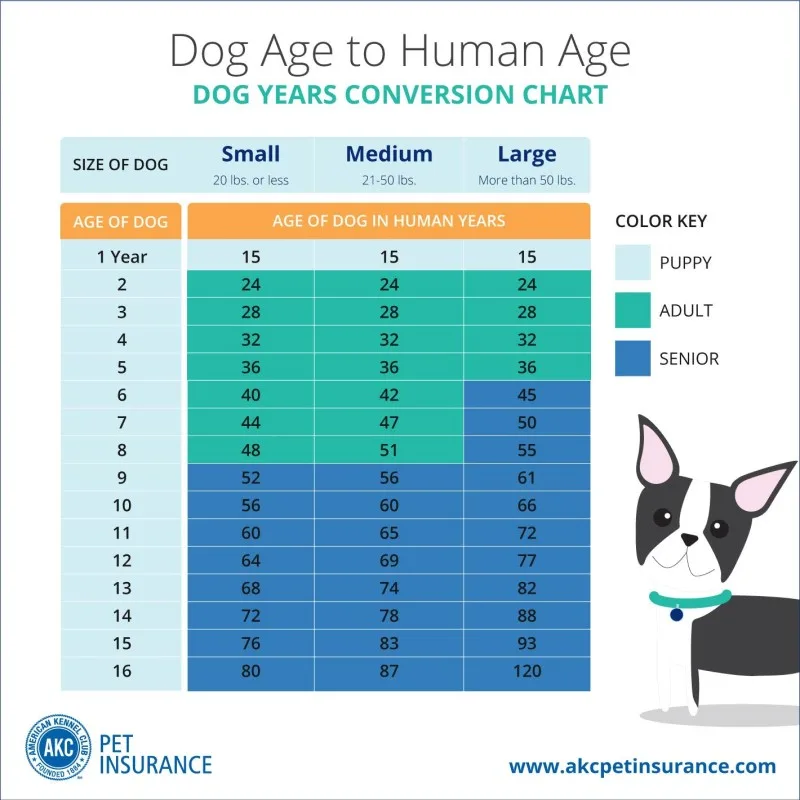Calculating Dog Years to Human Years
Find your dog's age in human years with our dog age chart. Learn how to add years to your pet's life by caring for their physical and mental well-being.

Since many dogs have the energy of a puppy well into their senior years, it can be rather difficult to guess their age. Everyone has heard the rule of dog years to human years that tells us that one year of a dog's life is equal to seven years of a human life, but is that accurate?
Surprisingly, that figure is widely accepted among pet health experts, but there are variations in how the dog to human years ratio works, and most of them have to do with either the size or the breed of the dog.
Calculating Dog Years
Dogs age differently than humans — and similarly, medium and large dogs grow differently than small dogs. In most instances, the smaller dog is expected to have the longer life expectancy, but breed and genetics come into play as well. For example, even if a larger dog lives as long as a small or medium-sized dog, they will spend more years of their life in the geriatric phase than their smaller counterparts.
Use the dog age chart below if you're wondering "How old in human years is my dog?," as well as find out how many years you can expect your dog to spend in each stage of life. Remember, one size does not fit all when it comes to canines and no age calculator for dogs is exact!
How Old Is a Dog in Human Years?

Aging in Dog Years
Whether your dog is two years old or 20, “age is just a number” when it comes to how spry your pup feels and acts, regardless of whether they are a large dog or a small dog. The level of energy your dog has for exercise and their attitude toward activity in general tells you much more about your dog's aging process than any arbitrary number. Moreover, your dog’s lifestyle, weight, and the amount of exercise they get are determining factors in their health and physical appearance.
Keeping Your Dog Young: Physical and Mental Engagement
You can add years to your dog’s life by keeping them engaged in activities like walking and swimming, while also ensuring that they get the appropriate amount of socialization with other dogs and people. By caring for your dog's physical and mental health needs and providing what they need to stay healthy, you give them better odds of living longer and staying healthy.
Checking in on your dog's mental health as part of their regular physical exams can be a great way to add years to their life as well. Dogs who experience minimal stress, anxiety, fear, and separation anxiety are more likely to be physical healthy and live longer, according to Psychology Today.
A large part of where anxiety and stress come from for dogs is lack of purpose. For this reason, obedience training can be as much a gift for your dog as it is for you and your household. Well-trained dogs have a better understanding of how to behave, and understand the boundaries set by their owners.
So, be sure you have your dog seen by a veterinarian who understands the connection between physical and mental health in their canine patients.
Consider Dog Pet Insurance to Maintain Canine Health
Even though dogs age more rapidly than their human counterparts, they will always be puppies in our eyes! AKC Pet Insurance (underwritten by Independence American Insurance Company) proudly offers coverage for dogs of all ages, sizes, and breeds with pet insurance plans to meet your needs and your budget alike. Start the year off right by getting a quote on a new dog insurance policy today!

Every Dog and Cat Deserves the Pet Insurance of Champions
Get prize-winning care for your pets.

Maggie Dean is the proud owner of a Bichon Frise / Cocker Spaniel mix named Rocco and a Holland Lop rabbit, Bunson. She’s been the Inbound Marketer at AKC Pet Insurance since 2016 but has had a passion for animals her whole life. If you’re an animal lover, don’t forget to follow us on Facebook to keep up with all things cute, funny, and interesting!
READ MORE ARTICLES

